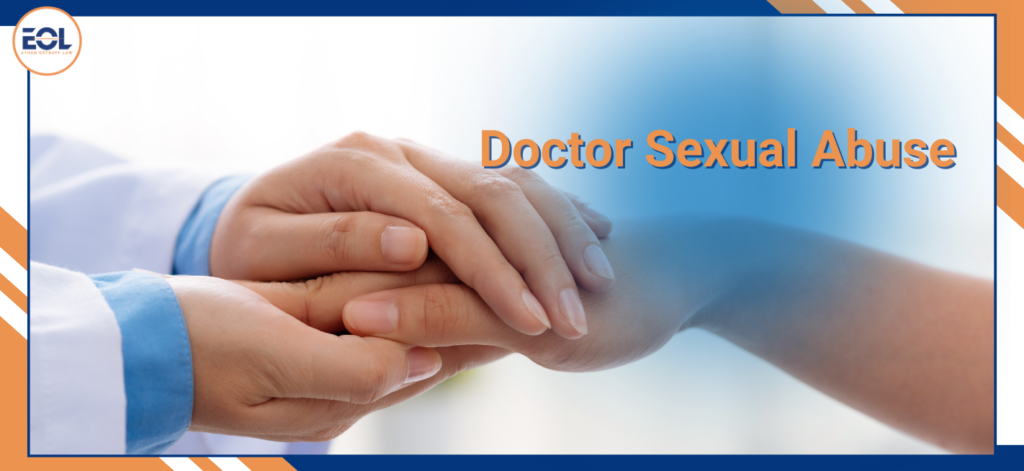Doctor Sexual Abuse: Legal Rights and Recourse for Victims
Doctor sexual abuse is a deeply troubling reality that too many people must face, leaving behind profound physical and emotional scars. Victims not only endure the pain of the abuse itself but also struggle with the complexities of seeking justice. At Ethen Ostroff Law, we recognize the significant impact of sexual abuse by a doctor and are firmly committed to advocating for the victims’ rights. In this guide, we explore the nuances of doctor sexual abuse, the legal options available for recourse, and how our firm can provide support throughout this challenging journey.
Sexual Abuse by Doctors
Doctor sexual abuse encompasses any unwanted sexual behavior by doctors toward their patients, exploiting the trust within the doctor-patient relationship. This can include inappropriate touching, lewd comments, coerced sexual acts, and even rape. Statistics on this issue reveal its alarming scope:
- A study by the Informed Patient Institute and Consumer Reports revealed that many state medical board websites inadequately handle dr sexual assault cases. This can lead to confusion among patients and reluctance among colleagues to report abuse.
- An analysis of 101 cases found that abuse forms included sodomy (31%), rape (16%), child molestation (14%), and purportedly consensual sex (7%). Many cases go unreported due to patients’ fear, shame, or disbelief.
- Anonymous surveys of US physicians indicate that 3–9% admit to past sexual contact with patients, predominantly men.
- Public Citizen’s Health Research Group discovered that two-thirds of doctors with strong evidence of sexual misconduct weren’t disciplined, based on data from the National Practitioner Data Bank.
- Since 1999, over 3,100 doctors in the US have faced disciplinary actions for dr sexual assault, with approximately 2,400 involving patients. Shockingly, only half of these cases resulted in revoked medical licenses.
Sexual Abuse vs. Sexual Assault
Differentiating between sexual abuse and sexual assault is crucial. Both involve non-consensual sexual behavior. However, sexual abuse usually occurs within relationships characterized by authority or trust. For example, a doctor and a patient. Meanwhile, sexual assault refers to a wider range of nonconsensual sexual acts. It includes those committed by strangers or acquaintances.

Forms of Doctor Sexual Abuse
Various forms of doctor sexual abuse violate the trust of the doctor-patient relationship, causing profound harm. Here are several types:
- Boundary violations: Crossing professional boundaries for sexual misconduct.
- Coerced sexual acts: Pressuring or forcing patients into sexual activity.
- Exploitation: Manipulating the relationship for sexual gratification.
- Grooming: Cultivating a relationship for sexual abuse.
- Inappropriate touching: Non-consensual sexual contact.
- Intimidation: Using power to silence victims.
- Lewd comments: Making sexually explicit remarks.
- Rape: Forced sexual intercourse without consent.
- Sexual assault: Any unwanted sexual contact.
- Sexual harassment: Creating a hostile environment through advances.
Other Medical Professionals and Sexual Abuse
Sexual abuse isn’t confined to doctors. Other medical professionals who may commit such misconduct include:
- Anesthesiologist.
- Chiropractors.
- Cosmetic surgeons.
- Dentists.
- Emergency medical technicians (EMTs).
- Gynecologists.
- Home health care aids.
- Medical assistants.
- Nurses.
- Nursing assistants.
- Obstetricians.
- Osteopaths.
- Paramedics.
- Pediatricians.
- Physical therapists.
- Physician assistants.
- Psychiatrists.
- Psychologists.
- Urologists.
- X-ray and imaging technicians.
Reasons Behind Doctor Sexual Abuse
Doctor sexual abuse can occur due to various factors:
- Boundary violations: Doctors may blur professional boundaries, leading to inappropriate relationships and misconduct.
- Culture of silence: Victims fear retribution or disbelief, leading to underreporting and allowing perpetrators to continue.
- Lack of oversight: Some medical institutions lack supervision or protocols to prevent and address misconduct.
- Opportunity: Medical settings provide opportunities for abuse under the guise of care.
- Personal gain: Perpetrators seek gratification or control over victims.
- Power dynamics: Doctors’ authority creates an environment where abuse can occur without consequences.
- Psychological issues: Perpetrators may have psychological problems contributing to their behavior.
- Societal stigma: Victims face shame, deterring them from seeking help.
- Trust and vulnerability: Patients’ trust makes them vulnerable to exploitation.
Addressing doctor sexual abuse requires systemic changes, including better training, awareness, and support systems.

Criteria for Sexual Abuse by Doctor
Sexual abuse by a doctor covers various non-consensual behaviors, all constituting abuse. Criteria for such abuse include:
- Abuse of power: Exploiting the doctor-patient power dynamic for gratification.
- Coercion or manipulation: Pressuring patients into sexual activity through threats or deception.
- Exploitation of vulnerability: Taking advantage of patients’ vulnerability due to their medical condition.
- Harmful intent: Causing physical, emotional, or psychological harm to patients.
- Inappropriate conduct: Making sexually suggestive remarks or advances during medical sessions.
- Lack of consent: Any sexual behavior without explicit patient consent is abusive.
- Misuse of position: Using doctor authority for sexual purposes.
- Non-therapeutic touching: Touching patients inappropriately without medical justification.
- Pattern of behavior: Consistent engagement in sexually abusive conduct.
- Violation of professional boundaries: Breaching ethical standards set for medical professionals.
It’s crucial to understand that any form of doctor sexual misconduct is unacceptable and can harm patients significantly. Victims should seek support and consider legal action.
Examples of Sexual Abuse by a Doctor
Examples of doctor sexual abuse vary in severity but often involve breaches of professional boundaries and exploitation of the doctor-patient relationship. Here are some examples:
- Coerced sexual acts: Pressuring patients into sexual activity for medical favors.
- Exploitative behavior: Exploiting vulnerable patients for gratification.
- Exposing patients to pornography: Showing explicit material without consent.
- Grooming: Building trust to initiate sexual activity.
- Inappropriate touching: Fondling without medical justification.
- Online sexual misconduct: Engaging in inappropriate behavior online.
- Recording patients without consent: Secretly filming for arousal.
- Sexual assault: Forcibly engaging in sexual activity.
- Sexually suggestive comments: Making explicit remarks.
- Unwanted advances: Initiating unwanted physical contact.
These examples highlight the breach of trust and ethical violations inherent in doctor sexual abuse. Victims must seek support and legal recourse for accountability and justice.
Warning Signs of Doctor Sexual Abuse
Warning signs of physician sexual abuse include:
- Doctors pressuring patients to accept gifts.
- Doctors sharing unrelated personal information.
- Doctors suggesting meetings outside office hours.
- Gratuitous physical contact.
- Lack of clear documentation.
- Making sexual remarks during appointments.
- Performing unnecessary exams.
Psychological Impact of Doctor Sexual Abuse
Victims of doctor sexual abuse often endure profound and enduring psychological effects, such as:
- Anger.
- Anxiety.
- Confusion.
- Depression.
- Difficulties forming future relationships.
- Embarrassment.
- Guilt.
- Impact on daily functioning.
- Post-traumatic stress disorder (PTSD).
- Self-esteem issues.
- Sexual dysfunction.
- Shame.
- Substance abuse.
- Suicidal thoughts and behaviors.
- Trauma.
- Trust issues.

Navigating Support and Legal Channels for Victims of Doctor Misconduct
In cases of sexual abuse, victims often seek guidance from doctors specializing in trauma recovery. Following such incidents, consulting a sexual assault doctor or sexual abuse doctor for evaluation and support is crucial. Additionally, victims may explore legal options, alleging misconduct by the physician during medical examinations.
Legal Options for Patients of Physician Sexual Abuse
Patients experiencing physician sexual abuse have legal options:
- Civil lawsuit: Pursue legal action through a civil lawsuit to hold the doctor financially accountable for their actions.
- Counseling and support: Seek therapy or join a support group to address emotional distress and trauma resulting from the abuse.
- Law enforcement report: Report the abuse to local law enforcement for investigation into potential criminal charges.
- State medical board complaint: File a complaint with the state medical board for investigation into potential violations of professional conduct.
Other Resources for Victims of Physician Sexual Abuse
Additional resources for patients experiencing physician sexual abuse include:
- Local rape crisis centers: Offer counseling, support groups, and referrals for survivors of sexual abuse.
- National Sexual Assault Hotline: Confidential support and resources are available 24/7. Call 800.656.HOPE (4673) or chat online at online.rainn.org.
- National Sexual Violence Resource Center: Provides information and support for survivors.
- Rape, Abuse & Incest National Network: Offers resources and support services, including a hotline and online chat. Website: rainn.org.
- Self-care resources: Practice mindfulness, meditation, exercise, and creative expression for healing.
- Support groups: Join survivor support groups for validation and peer support.
- Therapy and counseling: Seek specialized therapy for trauma recovery with experienced professionals.
Reporting Sexual Abuse
Reporting sexual abuse is a crucial step towards seeking justice and preventing further harm. It is challenging but crucial for accountability and protection. Here’s a general guide on how to do it:
- Immediate safety: If in danger, seek safety and call emergency services (911 in the US).
- Document evidence: Preserve texts, emails, photos, or injuries as evidence.
- Choose the reporting channel: Options include law enforcement, medical authorities, and licensing boards.
- Follow-up: Stay in touch with the authorities and provide the requested information.
- Seek support: Turn to trusted individuals or support organizations for emotional assistance.
- Know your rights: Understand your rights as a survivor of sexual abuse.
Where to Report Doctor Sexual Abuse
If you’ve experienced doctor sexual abuse, reporting promptly is crucial. Here are your options:
- Healthcare facility: Report the incident to the hospital or clinic where the abuse occurred; they’re obligated to address such cases and may have specific protocols.
- Law enforcement: File a report with your local police; they can investigate and pursue criminal charges.
- Legal assistance: Consult with a specialized attorney for legal guidance and representation.
- Online platforms: Some states offer online reporting for complaints against healthcare professionals. Check with your state’s medical board for details.
- Professional organizations: Report to relevant medical specialty associations; they may take disciplinary action and offer support.
- State medical board: Report to your state’s medical licensing board; they regulate medical practice and investigate misconduct.
- Victim advocacy groups: Seek support and resources from organizations specializing in sexual abuse.
When reporting, provide detailed information, prioritize your safety, and seek support. You deserve dignity and assistance throughout the process.
Civil Lawsuits vs. Criminal Charges in Physician Sexual Misconduct Cases
Victims of physician sexual misconduct can pursue civil lawsuits or criminal charges. Here’s a comparison:
Civil Lawsuits
- Purpose: Seek financial compensation for damages.
- Burden of proof: Requires a preponderance of evidence.
- Outcome: Potential monetary damages for harm suffered.
- Control: Victims have more control over the process.
- Timeframe: Resolution can take months or years.
Criminal Charges
- Purpose: Hold perpetrator accountable through punishment.
- Burden of proof: Requires evidence beyond a reasonable doubt.
- Outcome: The perpetrator may face incarceration or fines if convicted.
- Control: Prosecutors decide whether to pursue charges.
- Timeframe: Proceedings can be lengthy.
Victims should consult Ethen Ostroff Law to determine the best course of action.
Who Can File Claims for Sexual Abuse/Assault by Physicians
Anyone who experienced sexual abuse or misconduct during medical treatment by a physician can file a claim, regardless of gender, age, or background.
Statute of Limitations for Doctor Sexual Abuse Lawsuits
The statute of limitations for doctor sexual abuse lawsuits varies by state and jurisdiction. Prompt consultation with a personal injury lawyer is crucial to meeting filing deadlines.
Filing a Sexual Abuse or Assault Claim Against a Doctor
Filing a sexual abuse or assault claim against a doctor involves several steps and considerations. Here’s a general guide on how to proceed:
- Seek medical attention: Prioritize your well-being by seeking medical help and support from a therapist.
- Document evidence: Keep records, such as medical files and photos, to support your claim.
- Consult an attorney: Get advice from a specialized attorney who can explain your rights.
- File complaint: Consider reporting to law enforcement, the medical board, and the healthcare facility involved.
- Civil lawsuit: With legal help, pursue compensation through a civil lawsuit.
- Navigate legal process: Your attorney will guide you through gathering evidence and negotiations.
- Consider settlements: Settlement talks may resolve the case outside of court.
- Support and self-care: Lean on loved ones and self-care during this process.
Suing a Doctor's Employer
Victims of doctor sexual abuse might sue both the perpetrator and their employer for failing to supervise or address misconduct. Employers could include:
- Healthcare organizations.
- Hospitals.
- Medical clinics.
Evidence to Prove a Doctor Sexual Abuse
Gathering evidence to support your doctor sexual abuse claim is crucial to building a strong case. This may include:
- Correspondence with the perpetrator.
- Documentation of the abuse.
- Expert testimony from medical professionals and psychologists.
- Medical records.
- Witness testimony.
Defenses in Doctor-Patient Sexual Abuse Cases
Perpetrators of doctor sexual abuse may attempt to defend themselves by employing various strategies, including:
- Consent defense: Perpetrators may claim any sexual contact was consensual, despite the power imbalance.
- Denial: Some perpetrators deny the allegations, stating they never happened or were fabricated.
- Misinterpretation: Perpetrators might argue actions were misunderstood or unintentional.
- Professional justification: Some may justify actions as necessary for medical procedures.
- Victim blaming: Perpetrators may shift blame to the victim’s actions or behavior.
Victims need strong legal representation to counter these defenses and ensure accountability. An attorney can gather evidence and challenge false narratives.
Damages in Doctor Sexual Abuse Cases
Victims of sexual abuse by doctor may be entitled to various forms of compensation, including:
- Lost wages.
- Medical expenses.
- Pain and suffering.
- Punitive damages.
- Therapy costs.
An attorney can evaluate your damages and pursue fair compensation for you.
Consequences for Doctors Engaging in Sexual Abuse
Doctors who commit sexual abuse face severe consequences, both professionally and legally. Here are some potential repercussions:
- Civil lawsuits: Victims can seek compensation, leading to significant financial penalties.
- Criminal charges: Doctors may face imprisonment, fines, and mandatory sex offender registration.
- Ethical violation: They may face disciplinary actions, potentially expulsion or suspension.
- Impact on personal life: Strained relationships, social isolation, and reputational harm can occur.
- Loss of medical license: They may lose their license, ending their medical careers.
- Mental health consequences: Guilt, shame, and mental health issues like depression may arise.
- Professional reputation damage: Allegations can lead to a loss of trust and job opportunities.
Importance of Sexual Abuse Injury Claims
Beyond compensation, doctor sexual abuse claims hold perpetrators accountable and prevent future abuse. Pursuing legal action empowers victims and promotes safety for others.
Hire Ethen Ostroff Law for Your Doctor Sexual Abuse Case
Doctor sexual abuse is a pervasive and deeply troubling issue that demands attention and action. At Ethen Ostroff Law, we are committed to standing up for the rights of victims and holding perpetrators accountable for their misconduct. If you have been a victim of doctor sexual abuse, Contact Ethen Ostroff Law now at 610-510-8883 ( by calling this number, you consent to receive SMS updates from Ethen Ostroff Law) or Submit Form to get free consultation. Learn more about your legal options for seeking justice and healing.


